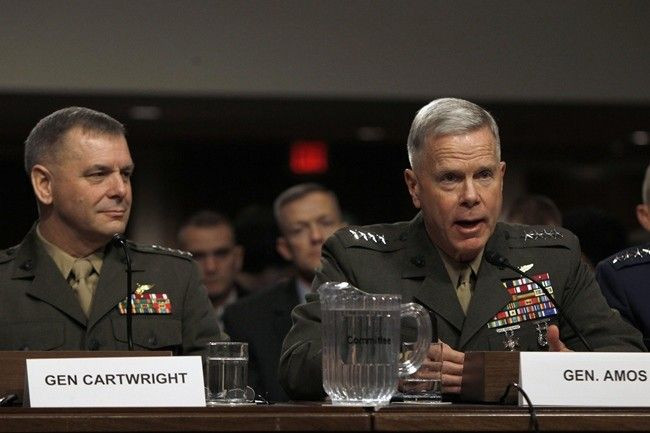U.S. military chiefs split on lifting gay ban

Top leaders of the U.S. armed forces agreed on Friday that if ordered to, they could implement a repeal of the Don't Ask, Don't Tell policy banning openly gay service members, although some recommended it not take place at this time.
At a hearing of Senators reviewing the possibility of repeal, the head of the U.S. Marine Corps opposed a change and the Air Force commander said if changed, the implementation should not take place until 2012.
Commandant of the Marine Corps General James Amos came to his conclusion after reviewing a survey of troops released this week showing 56 percent of Marines in combat arms surveyed viewed repeal negatively with respect to unit effectiveness, unit readiness and cohesion. Across all specialties in the Marines, 45 percent viewed the repeal negatively, he noted.
Their message to me is that the potential exists for disruption to the successful execution of our current combat mission should repeal be implemented at this time, he said.
General Norton Schwartz of the United States Air Force said he took exception to the risk assessment in a study issued by U.S. military Commander in Europe Carter Ham and Department of Defense counsel Jeh Johnson supporting a repeal.
The Air Force can implement a repeal with modest risk to military readiness and effectiveness, unit cohesion, recruiting and retention on your Airmen, Schwartz said.
Nonetheless, my best military judgment does not agree with the study assessment that the short-term risk to military effectiveness is low, he said.
Schwartz recommended that certification of the repeal by Sec. Gates and Chief of Staff Mike Mullen for full implementation not take place until 2012, while initiating training and education efforts soon after you take any decision to repeal.
Gen. George Casey of the U.S. Army said properly implemented, I do not envision that it would keep us from accomplishing our world-wide missions - including combat operations.
Nevertheless, Casey said implementing the policy would add another level of stress to an already stretched force, be more difficult in combat arms units, and be more difficult for the Army than the report suggests.
Admiral Gary Roughhead, the U.S. Navy Chief of Naval Operations, favored a legislative repeal of the policy instead of a decision by the courts.
Legislative appeal affords us the time and structured process needed to effectively implement this significant change within our Armed Forces, he said.
He assessed the overall risk as low, but said a moderate risk was associated with projected retention in some Navy irregular warfare specialties.
© Copyright IBTimes 2024. All rights reserved.





















